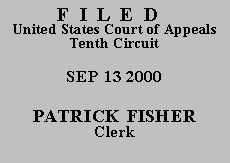

| HOME CARE ASSOCIATION OF AMERICA, INC., a domesticated Oklahoma corporation; THE OKLAHOMA CHAPTER OF HOME CARE ASSOCIATION OF AMERICA, INC.; LAKE COUNTRY HOME CARE, INC., an Oklahoma corporation; CARING CONNECTION, an Oklahoma corporation; LIVING HOPE HEALTH CARE, INC., an Oklahoma corporation; and MARSHALL COUNTY HOME HEALTH, an Oklahoma corporation, and all others similarly situated, |
|
| v. | |
| UNITED STATES OF AMERICA; HEALTH AND HUMAN SERVICES, DEPARTMENT OF; HEALTH CARE FINANCIAL ADMINISTRATION; PALMETTO GOVERNMENT BENEFITS ADMINISTRATORS, a division of South Carolina Blue Cross and Blue Shield a South Carolina corporation, |
The district court concluded that it had federal question jurisdiction over the case, but rejected plaintiffs' claims on their merits, concluding that plaintiffs suffered no cognizable constitutional deprivation or other injury because of the passage of the BBA and its implementation through the pertinent regulations. Plaintiffs appealed that decision.
We abated the appeal, pending the Supreme Court's decision in Shalala v. Illinois Council on Long Term Care, Inc., 120 S. Ct. 1084 (2000). The Supreme Court subsequently issued its decision in Illinois Council, holding that a nursing home association's claim that "certain Medicare-related regulations violated various statutes and the Constitution" must proceed first "through the special review channel that the Medicare statutes create." Id. at 1089.
We asked the parties to file supplemental briefs on the effect, if any, of Illinois Council on the issues presented in this case. Defendants argue that Illinois Council clearly establishes that the district court erred in finding subject matter jurisdiction over the case. Plaintiffs argue summarily (in a single paragraph) that Illinois Council is distinguishable in that the plaintiffs in Illinois Council challenged Medicare regulations, whereas plaintiffs here challenge "the underlying legislation upon which the agency's regulations are promulgated." Appellants' Response to Decision at 2.
We agree with defendants that Illinois Council compels the conclusion that plaintiffs' failure to first exhaust the administrative remedies provided by the Medicare statute deprived the district court of subject matter jurisdiction. 42 U.S.C. § 405(h), made applicable to the Medicare Act by 42 U.S.C. § 1395ii, provides:
The findings and decision of the [Secretary] after a hearing shall be binding upon all individuals who were parties to such hearing. No findings of fact or decision of the [Secretary] shall be reviewed by any person, tribunal, or governmental agency except as herein provided. No action against the United States, the [Secretary], or any officer or employee thereof shall be brought under section 1331 or 1346 of title 28 to recover on any claim arising under this subchapter.
The Supreme Court in Illinois Council interpreted that provision broadly: "it demands the 'channeling' of virtually all legal attacks through the agency, [so as to] assure[] the agency greater opportunity to apply, interpret, or revise policies, regulations, or statutes without possibly premature interference by different individual courts . . . ." Illinois Council, 120 S. Ct. at 1093 (emphasis added). The Court reaffirmed its prior holdings in Weinberger v. Salfi, 422 U.S. 749 (1975) and Heckler v. Ringer, 466 U.S. 602 (1984), including its statement in Salfi that section 405(h)'s jurisdictional bar applies "irrespective of whether resort to judicial processes is necessitated by discretionary decisions of the Secretary or by his nondiscretionary application of allegedly unconstitutional statutory restrictions." Salfi, 422 U.S. at 762.
Thus, the Court emphasized that its prior decisions construing § 405(h):
foreclose distinctions based upon the 'potential future' versus the 'actual present' nature of the claim, the 'general legal' versus the 'fact-specific' nature of the challenge, the 'collateral' versus 'non-collateral' nature of the issues, or the 'declaratory' versus 'injunctive' nature of the relief sought. Nor can we accept a distinction that limits the scope of § 405(h) to claims for monetary benefits. Claims for money, claims for other benefits, claims of program eligibility, and claims that contest a sanction or remedy may all similarly rest upon individual fact-related circumstances, may all similarly dispute agency policy determinations, or may all similarly involve the application, interpretation, or constitutionality of interrelated regulations or statutory provisions. There is no reason to distinguish among them in terms of the language or in terms of the purposes of § 405(h).
Illinois Council, 120 S. Ct. at 1094.
Accordingly, we vacate the judgment and remand this case to the district court with instructions to dismiss it for lack of jurisdiction.(1)
ENTERED FOR THE COURT
Stephen H. Anderson
Circuit Judge
*.This order and judgment is not binding precedent, except under the doctrines of law of the case, res judicata, and collateral estoppel. The court generally disfavors the citation of orders and judgments; nevertheless, an order and judgment may be cited under the terms and conditions of 10th Cir. R. 36.3.
1.The district court ruled against plaintiffs on the merits of their claims. While our disposition makes it unnecessary to address the merits, we discern no error in the district court's rejection of plaintiffs' claims.